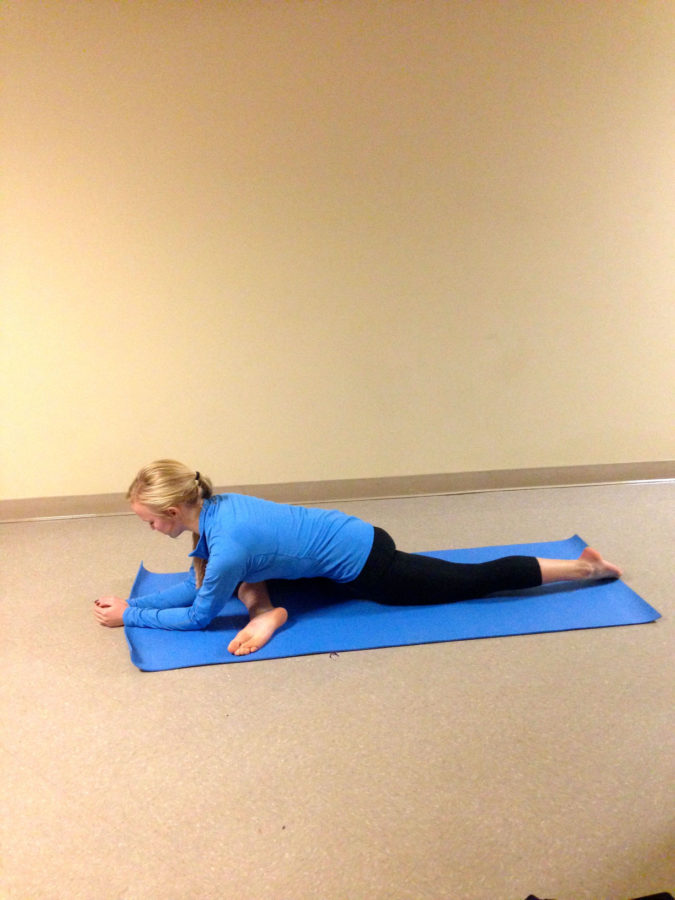Work out, don’t stress out
Dec 11, 2014
With final exams quickly approaching, the stress levels on campus are quickly rising. However, before wallowing in self-pity and a growing pile of class notes, students should look for healthy ways to deal with their stress.
This can be as simple as taking a short break from studying or homework to work out. According to studies done by the Anxiety and Depression Association of America, exercise can be used to reduce fatigue, increase alertness and concentration, and improve cognitive function. The endorphins released through exercise can improve sleep and lift one’s mood, too. Running, walking and yoga are the most common methods of exercise to reduce stress, but many other options are offered on campus.
Lisa Kinderman, a clinical counselor and the chair of the Integrative Health and Wellness Treatment Team at the Counseling Center, said that she discusses exercise as a stress-management technique because of the way it affects people’s bodies and the chemicals in their brains. She said the “runner’s high,” or endorphins released during a workout, can lead to a sense of well-being after the workout. In some clinical studies, exercise has been shown to be as effective as some antidepressant medications.
“If (students) aren’t feeling great when they go into the ARC, when they leave, they typically feel different. They generally feel better,” she said.
For students who purchase a Group Fitness Pass through Campus Recreation facilities, there are a variety of classes offered every day at both the ARC and CRCE, including yoga, cycling, zumba and water workouts.
Get The Daily Illini in your inbox!
Melissa Wagner, sophomore in LAS, likes to attend a spin class at the ARC. She attended group fitness classes in her hometown and was happy to continue taking them on campus. She said that the structure of the class is helpful to her.
“I won’t sit on a bike for 40 minutes if I go by myself, or when I get tired, I’ll make it easier,” Wagner said. “With the classes, (the workout) is all structured for you, and the instructors will help you adjust the bike if you are a beginner. The group atmosphere helps motivate you to keep going.”
Wagner said that classes can be small, with only three or four people typically on weekdays, while classes on Friday nights or Sunday afternoons may be filled up.
“It helps to have a time on the schedule that I can’t move around, so I can base my schedule around that,” she said. “I treat it like a scheduled meeting.”
When she has a bad day, Wagner said that exercise helps her feel better.
“It gets me focused on something else. Instead of being in my own head or focusing on what’s going wrong, I focus on my body, my breathing, how I’m responding to the exercise,” she said. “The release of endorphins is really nice. When I’m walking back, I can refocus on the task.”
For students intimidated by the thought of a large class or who would prefer to get one-on-one attention, personal trainers at the ARC can be utilized for their knowledge of exercise techniques.
Lamija Rahmanovic, sophomore in AHS, works with her trainer, Suzi Walthall, and acknowledges that working out regularly is one of the best ways to combat stress.
“It allows me to channel my energy into something productive,” Rahmanovic said in an email. “If I feel anger, I can use exercise to release that anger, and I feel better afterwards.”
Exercise can be extremely beneficial when used as a study break. Kinderman said that the brain is only equipped for around 45 minutes of intense, productive studying.
“When our brains get tired, it will manifest for us physically,” Kinderman said.
The Women’s Resource Center also provides free fitness classes for women-identifying students in the Women on the Move series. On Tuesday nights, the class is Belly Fit, and on Thursdays, the class is Yoga for Healing. Both classes run from 5:30 to 6:30 p.m. Rachel Storm, the assistant director of the center, is in charge of the planning and development of many of the programs.
Storm said that the yoga class taught at the Women’s Resource Center has partnered with Amara Yoga, a studio in Urbana that requires its instructors-in-training to volunteer as yoga teachers for local groups.
“We were able to develop this yoga practice that is a gentle-flow yoga that really centers people’s emotional and spiritual experiences and allows a healing space,” Storm said.
The program is beneficial to both people who are recovering from a trauma, such as a sexual assault, and those who want the peaceful feeling brought on by doing yoga.
For students who are not comfortable or who have not had much experience doing yoga, Storm said that the instructors receive training in how to teach fitness while keeping in mind body size diversity and trauma survivors who may not be comfortable being touched.
“We also work to make sure that the class is accessible for those people who are pregnant, people who are of size and people who have a disability,” she said. “The trainers are encouraged to always give alternatives as standard practice.”
Classes are open to all women-identifying students, and no prior knowledge is needed. The Women’s Center encourages people to dress comfortably, but provides all other materials, including yoga mats, hip scarves and zills, the finger cymbals used in belly dancing.
Storm said that the Women on the Move nights work alongside the body image programing at the center to encourage a “Health at Every Size” mentality.
“We believe that fitness can be for everyone,” she said.
Isabella can be reached at [email protected].






